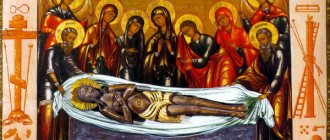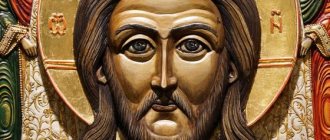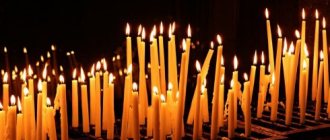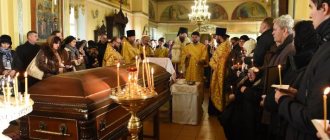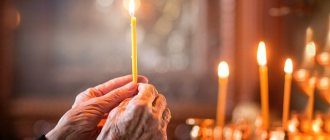Every person, sooner or later, is faced with the death of a loved one. This is a heavy loss that you have to put up with, because nothing can be changed. Relatives and friends of the deceased are ready to visit the cemetery every day, but not everyone knows that visiting the grave on his birthday is not recommended. How to behave correctly on this day, how to remember the deceased, is it possible to celebrate the birthday of a deceased person by going to the cemetery?
It is not customary to celebrate the birthday of a deceased person (as well as his name day). However, you can always go to church, pray and light a candle for the repose of his soul.
The mystery of death
Death is the most mysterious phenomenon for humans. All people know about its inevitability and at the same time try to isolate themselves from thoughts about it. But sooner or later everyone inevitably comes face to face with death. We all lose family and friends. If a person believes in the immortality of the soul, he begins to wonder what can now be done for the deceased. In particular, questions arise about the birthday of the deceased. How is the birthday of a deceased person celebrated? How to remember the deceased on his birthday? Let's answer these questions.
Orthodox cemetery
“Oh, death! how bitter is the memory of you for a person who lives calmly in his possessions, for a person who is not bothered by anything and is happy in everything and is still able to eat food” (Sir. 41:1).
How to behave in a churchyard
The Church does not welcome the pagan custom of bringing food or drinks to a cemetery, or leaving food at the grave of a deceased person. You cannot eat in the churchyard, or have a communal meal, as it were, this is a relic from before the Christian era.
If parents take their children with them, then they need to explain the rules of behavior in advance - tell them that they cannot run around the cemetery, take sweets or drinks from other people’s graves, laugh, or listen to loud music.
According to the teachings of the Church, there are no souls of the dead in graveyards, since they have moved on; coming to burials brings benefits to living people. This is a place where you can revive the memory of your departed relatives and friends, and think about the fleeting nature of earthly life. Once again, realize that it is impossible to take your career, houses and money with you to the next world. You need to understand that you need to live in such a way that you don’t later regret missed opportunities to do good, forgive those who offend you, and ask for forgiveness yourself. Hurry before it’s too late to go to the temple and get closer to God.
Christ conquered death!
The Lord created man for an eternal joyful life in the Garden of Eden. However, the sinful poison that the first people tasted poisoned the human body with decay and death. As it is said in the Old Testament book of the Wisdom of Solomon:
“God created man for incorruptibility and made him the image of His eternal existence; but through the envy of the devil death entered the world, and those who belong to his inheritance experience it” (Book of the Wisdom of Solomon, 2–23, 24).
Man doomed himself to eternal torment far from God and His Love. But everything changes with the coming of Christ into the world. The Cross became the door to heaven. The instrument of execution on which Jesus Christ voluntarily sacrificed himself for the sins of mankind.
“The death of the Lord gave us immortality; Having descended into hell, He crushed its forces and destroyed its power” (St. John Chrysostom).
The resurrected Christ abolished death, giving immortality of soul to those who believe in Him.
"Death! where is your sting? hell! where is your victory? (1 Cor. 15:55) - the Christian world solemnly exclaims through the mouth of the Apostle Paul. And through two millennia, encouraging words sound:
“I am the resurrection and the life; He who believes in Me, even if he dies, will live; and whoever lives and believes in Me will never die” (John 11:25-26).
Why do omens come true at funerals?
Funeral signs were passed down by people from generation to generation. There were reasons for the appearance of signs. For some it may be a belief in the supernatural, and for others it may be respect for a deceased relative. Such signs often come true because a person believes in them and tries to observe them.
Signs have an important place in a person’s life, and especially when he is faced with funerals and death. Traditional beliefs help maintain the mourning mood and maintain respect for the deceased. Nowadays, omens are peculiar, familiar rituals that are performed when someone close to you has died.
Life after death
Jesus Christ took upon himself the sinful burden that drives people away from God. He gave the key to the immortality of the soul:
“Truly, truly, I say to you, he who hears My word and believes in Him who sent Me has eternal life and does not come into judgment, but has passed from death to life” (John 5:24).
He who listens to Christ is one who has tried to keep His commandments. He gave love, performed acts of mercy, participated in the Sacraments and repented of his sins. A person who constantly goes towards the Lord on earth will be met by Christ in the afterlife.
“Those who carefully strive in virtue, moving away from this life, are truly, as it were, released into freedom from suffering and bonds” (St. John Chrysostom).
The soul, which hid from the Divine Light in earthly life, will be blinded when it finds itself face to face with Him. She will be attracted to the usual darkness of passions and sinful inclinations.
“Just as the blind, who do not see the shining sun, although completely illuminated from all sides by it, are nevertheless outside the light, being removed from it by sense and sight. So the Divine light of the Trinity is in “everything.” But sinners, imprisoned in darkness, and among him will not see him and have absolutely no divine knowledge and feeling, but scorched and condemned by their own conscience, they will have unspeakable torment and inexpressible sorrow forever” (Rev. Simeon the New Theologian).
However, the final fate of the soul is not decided until the Day of Judgment. It is then that sinful people will forever be separated from the righteous and removed from the Lord.
“The peace of the righteous and the sorrowful state of sinners, until the day of general judgment, is not a complete reward, but each departed soul, after the preliminary judgment over it, remains still awaiting either the full abundance of eternal joys or more severe eternal torments” (Metropolitan Sergius (Lyapidevsky) .
After parting with the body, the soul can no longer bear the fruits of repentance. But our prayerful memory of them can do this for our deceased relatives.
What not to do after the funeral of a close relative
A funeral is a special ritual that is of great importance for the relatives of the deceased. After the funeral procession, you should not perform certain actions.
Is it possible to visit after the funeral?
After burying a dead person, you cannot visit anyone for one day.
Is it possible to watch TV
Watching TV and listening to music after the funeral is not prohibited. But it is better to maintain a calm, quiet atmosphere as a sign of respect and honor for the life and death of the deceased.
Is it possible to make repairs
Repairs can only be carried out forty days after the funeral of the deceased person. The sign says that for forty days after its bodily death, the soul remains to observe loved ones and it wants to see the same environment as during life.
Is it possible to wash, shave and get a haircut?
These actions should not be performed during the period when the deceased is in the house and immediately after his funeral. It is believed that performing bath procedures is disrespect for the death of a person. Therefore, it is better not to shave or wash for several days after the funeral.
What to do with a scarf after a funeral
The scarves you wore at the funeral must be burned. Although in some cultures it is customary to leave scarves after a funeral and pray with them for the deceased, as if leaving a memory of him in the form of a scarf.
You can't wear the clothes of a dead person
The clothes of a living person absorb his energy, but when a person dies, his energy also becomes dead. Wearing the clothes of a deceased relative can transfer their dead energy to you. It is also believed that the deceased’s belongings also contain the cause of his death. The risk increases that by wearing a dead man's clothes you are dooming yourself to disaster, and the cause of your relative's death seems to be transferred to you. Another sign says that you should not burn or throw away the things of the deceased within a period of forty days.
What to do with the belongings of the deceased after the funeral
It is not recommended to throw away the deceased's belongings, especially if they hold a special memory of that person. It's better to give things to people in need. Also, things of a dead person can be recycled. Traditions advise not to touch the deceased’s belongings at all for forty days, and after that they can be burned.
How to celebrate the birthday of a deceased person
Death, as a transition from earthly life to eternity, does not terminate the existence of the soul.
“God is not the God of the dead, but of the living” (Matthew 22:31). Many people have experience confirming these words. After all, our love for departed people does not end at the moment of their physical death. It finds its expression in our prayerful memory of the departed.
It is not for nothing that the Orthodox Church has established special days of remembrance of the dead.
This is the third, ninth, fortieth day from the date of death, parental Saturdays, Radonitsa. In addition, it is customary to especially remember departed relatives on the day of their death. That is, at the moment of their birth for a new eternal life. On the day of Epiphany, when a new Christian was born. And on the birthday of the deceased, when his soul appeared in this world.
“On birthdays or Angel’s Day, we pray for the departed because we remember and love them. And if during our lives we prayed for the health of our loved ones, then after their death we ask God for their salvation” (Priest John Kokhanov).
Birthday is the first point on a person’s path to God. And a person will always be reverent about the moment when his eyes first saw this world. Commemoration on the birthday of the deceased is a tribute to memory and respect, spiritual connection and prayerful support. This is a manifestation of our love, which does not end even after mortal separation. Priest Georgy Kharin emphasizes:
“The most important thing is not to lose your inner connection with this person. Don’t forget him, do something good in memory of him.”
Poems about departed children:(
How my heart sank desperately, How a scream broke the silence, And my hands flew up to the sky - “I want to go to my son. To him. »
*
Mom’s heart bleeds again with her grief - tete-a-tete. And the truth torments the soul: There was an Angel and... NO ANGEL
*
*
*
My dear, good, my SON. How did it happen to us? Our whole life shattered in an instant, Split into “before” and “now”.
*
A path of endless salty tears Along the cheeks, along the lips, along the hand, And the whole soul flowed out, Leaving a bloody trail
*
The tenth cigarette? hundredth?. In the fingers of a trembling hand, You and I will definitely meet, Even if we are far away now.
*
I don’t need anyone’s sympathy And advice “Just be strong.” Can words fix anything? Will they be able to bring his life back?
*
It is impossible to believe in anything - In justice, in God, in a dream. It all turned out to be fake, Could not avert trouble.
*
You are my angel, my beloved, the only one, the most tender, the dearest, I love you, my kitten, I want to be next to you.
*
I don’t need anyone’s sympathy And advice “Just be strong.” Can words fix anything?
*
She pressed him to her chest with love, raised him, took care of him, and death took him away irrevocably. Well, how, fate, could you?!
*
Mom doesn't believe in her son's death. The mother vaguely remembers how the news was suddenly announced, how a lump suddenly stuck in her throat. Inconsolable tears are falling from the Candles of Sorrow today, now. Their fire flickers so sadly. Their sad song is so dark.
*
. Bright memory of all those who have gone to Paradise. To them is the fire of all Sorrowful Hearts. Regret about what happened. To our Loving Souls Eternal Light.
*
I got lost, lost my goal. Protest against the damned death And against cruel fate! “Where is my son? Where is my dear Angel? - The angel is no longer alive
*
Only pain, sorrow, resentment and bitterness are visible in the mother’s eyes, As she remembers how she caressed and carried him in her arms.
*
Their destinies are like the history of the planets. Each one has everything special, its own, and there are no planets similar to it.
*
And if someone lived inconspicuously and became friends with this inconspicuousness, he was interesting among people by his very uninterestingness.
*
And if a person dies, his first snow, and his first kiss, and his first fight dies with him. He takes all this with him.
*
Yes, books and bridges, cars and artists’ canvases remain, yes, much is destined to remain, but something goes away anyway!
*
This is the law of the ruthless game. It is not people who die, but worlds. We remember people, sinful and earthly. What did we really know about them?
*
What do we know about brothers, about friends, what do we know about our only one? And about our own father, although we know everything, we know nothing.
*
People are leaving. They cannot be returned. Their secret worlds cannot be revived. And every time I want to scream again from this irrevocability.
*
Church prayer for the deceased on his birthday
The birthday of the deceased is another reason to show love for him and prayerfully honor his memory.
“The duty of love to our neighbors obliges us to pray for the departed who have passed into eternity. <…> By praying for the departed, we thereby testify to our love for them, express compassion and mercy” (Archimandrite Kirill (Pavlov).
Therefore, to the question: “how is the birthday of a deceased person celebrated?” There is a clear answer - you need to pray. They pray both in private prayer at home and in congregation in church.
The apogee of all church life is the Divine Liturgy. On it, bread and wine are transformed into the Body and Blood of Christ, sacrificed to atone for sins. Therefore, as St. Cyril of Jerusalem writes:
“Great will be the benefit of the souls for whom prayer is offered at the time when the Holy and Terrible Sacrifice is offered.”
The tradition of commemorating deceased relatives dates back to apostolic times, as St. John Chrysostom reminds us:
“It was not in vain that the apostles legitimized the creation of memory of those who died during the performance of the Terrible Sacraments. They knew that there would be great benefit for the dead, that they would receive much benefit from this. When all the people stand with outstretched hands, and a host of priests with them; when the Terrible Sacrifice is presented, how can we not appease God by praying for those people?”
In addition to commemoration at the proskomedia, you can order a memorial service. This is a special service in which they pray for the forgiveness of the sins of the deceased and granting them peace in the Kingdom of Heaven.
Priest Philip Ilyashenko speaks figuratively about the importance and necessity of church commemoration of the departed:
“You can compare this (commemoration in Church) with how you need to wash your hands when you come home, but this is not enough, sooner or later you need to go to the shower or to the bathhouse. Thus, the crown and meaning of everything that happens in the Church is the sacrament of the Divine Eucharist, the liturgy, when we remember the living and the dead, when we partake of the Body and Blood of Christ.”
Church commemorations
You can remember the deceased on any day or his birthday by ordering in the church:
- A memorial service is a special short service conducted by a priest in a temple, cemetery church, or at the grave of the deceased. There is an individual memorial service - for burial, on the 3rd, 9th, 40th day and, if necessary, on any other day after the fortieth day. And the general one - on Parents' Saturdays and Radonitsa, when all departed Christians are remembered;
- Litiya - intense prayer for the deceased outside the church, usually in a cemetery (it is also possible for the living, in serious circumstances);
- A short remembrance is to order a mass (once during the liturgy), a sorokoust (services for 40 days), a six-month, an annual remembrance, and an eternal remembrance (in monasteries).
After church prayer, you can go to the graveyard, visit the grave, plant grass, flowers, the man needs to renew the cross or monument. It is not forbidden to note the date of birth of the deceased at the table, together with close people, remember him, say a few kind words or remember some events associated with him. The main thing is that the funeral dinner does not turn into a rich feast, when the guests themselves do not remember why they decided to celebrate.
Prayer for loved ones: how the birthday of a deceased person is celebrated at home
People who have passed away from earthly life need only one thing - sincere prayer for them. Therefore, in addition to prayer in Church on the birthday of the deceased, it is necessary to remember him in a private address to the Lord.
“When you pray for the repose of the soul of the deceased, force yourself to pray for him with all your soul, remembering that this is your essential duty, and not that of the priest and cleric alone” (Righteous John of Kronstadt).
There is a pious tradition of reading the Psalter for the departed. This book consists of spiritual psalm songs written by the Old Testament King David and other authors.
“Reading the psalter in memory of the departed undoubtedly brings them great consolation. <...> It brings them great benefit, for it is accepted by the Lord as a pleasant propitiatory sacrifice for the cleansing of the sins of those remembered: just as in general every prayer, every good deed is accepted by Him” (St. Athanasius Sakharov).
It would be appropriate to visit the cemetery on the birthday of the deceased. There you can perform the rite of litia - a short requiem service that can be read by the laity. We can also honor the memory of the deceased by giving alms in his name.
“There should be no doubt that the prayers of the Holy Church, the Saving Sacrifice and alms performed for the souls of the dead will help them so that the Lord will be more merciful to them than what they deserve for their sins” (Blessed Augustine).
Features of beliefs
At all times, there have been different beliefs in signs, rituals and traditions. Beliefs had a particularly strong influence on people in the pre-Christian period. Since ancient times, people have believed that death carries negative energy. They thought the same about anyone who died. Along with this, certain signs have emerged, that is, what can happen if you make a mistake in organizing and conducting a funeral.

